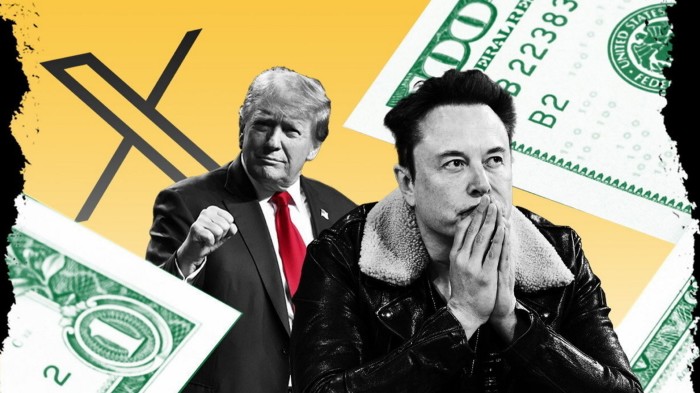Are Trump and Musk now enemies?

Fire the scriptwriters. America Season 7 is getting out of hand. Even if Elon Musk somehow makes amends with Donald Trump — a telephone call is apparently scheduled — the breach between the world’s richest man and its most powerful will surely persist. You cannot call for Trump’s impeachment, make insinuations about his relationship with the late paedophile Jeffrey Epstein, claim full credit for his election victory and pretend it never happened.
Trump is notoriously thin-skinned. If you take Musk at face value, their curdling relationship stemmed from what he sees as the big but not beautiful Republican budget — “a disgusting abomination” in the rocket man’s choice phrasing. But psychology, not fiscal philosophy, is a better lens on these men’s behaviour. As the late-night comedian Stephen Colbert put it: “I’m starting to worry that two narcissistic megalomaniacs with a total inability to see value in other humans might have a hard time making friends.”
Musk clearly thinks he is in a position to harm Trump. But Trump holds almost all of the cards. Should the unfettered US president wish to destroy Musk’s companies, he could do so. All of them depend to one degree or another on the federal government for regulatory clearances and approval, contracts, and, therefore, competitive advantage. A large chunk of Musk’s wealth comes from his stake in Tesla, which is still trading at more than 100 times earnings. By blocking approval for its fully autonomous version, Trump could harm the company. Watch also for Jeff Bezos to wheedle his way into Trump’s good graces. Bezos’s Blue Origin is the only plausible competitor to SpaceX, the other main source of Musk’s paper wealth.
Indeed, the real cause of their falling out has little to do with the US fiscal deficit, whatever Musk claims. To be sure, Trump’s “big, beautiful bill” must have felt like a humiliation for Musk, who promised to find $2tn in fiscal savings with his so-called Department of Government Efficiency only to see Trump add more than that to the deficit. “Was it all bullshit?” Trump reportedly asked aides of Doge. I presume his question was rhetorical. Musk’s real complaint is that the budget would scrap tax credits for electric vehicles, which will leave his ailing Tesla flagship even worse off than it already is. He is still also apparently seething over Trump’s deepening partnership with Sam Altman, OpenAI’s chief executive, with whom Musk fell out several years ago. That “Scam Altman”, as Musk calls him, was scheduled to appear with Trump at an event last month in Abu Dhabi was a red line. Musk derailed the Trump-Altman public appearance but not the artificial intelligence data deal that they were in the Gulf to unveil. Stargate UAE, like Stargate USA that was announced in January, makes OpenAI Trump’s favourite in that rapidly expanding sector. Musk’s so far unsuccessful xAI was kept out of the deal. Earlier this week, the White House also abruptly withdrew the nomination of Musk’s friend Jared Isaacman as the next head of Nasa.
In short, Musk has vastly overestimated his leverage. I do not know whether his reported ketamine usage played a role — the famous “K-hole” resulting in overuse of the anaesthetic leads to paranoid delusions and psychotic episodes. But Musk is prone to narcissism without any pharmaceutical help. Think of Jack Nicholson’s face in The Shining suddenly looming over that vast empty hotel in the Rockies. Now picture Musk’s face peering over Capitol Hill as he swats Trump’s signature legislation. He thought he could kill Trump’s priority bill with a couple of social media postings. The world’s biggest plutocrat has lost grasp of reality. Musk accused Trump of ingratitude for failing to reward him for the nearly $300mn in election help he provided. But Musk’s companies have won $38bn in federal subsidies and contracts over the years. He repaid Washington by taking a chainsaw to government. Now that’s real ingratitude.
Which leads me to my own question — this time for Joe Miller, a great colleague in our DC bureau who is covering the oligarchs in Washington. Joe, how do you think Musk, so clear-minded in business, ended up making such a bad bet?
Recommended reading
-
My column this week addresses “the great Trump riddle on China”. We know Trump’s mind on most things but on Taiwan, economic decoupling and US-China relations in general, we are still in the dark. “The Chinese are as confused about Trump’s endgame as everyone else,” I write.
-
Talking of Musk, everyone should read this searing Michelle Goldberg column in the New York Times on Musk’s legacy of “disease starvation and death”. “If there were justice in the world, Musk would never be able to repair his reputation, at least not without devoting the bulk of his fortune to easing the misery he’s engendered,” she writes.
-
Even if Musk resettles on Mars, all of us need to pay greater heed to the morbidities of our tech elites. The new HBO film, Mountainhead, written by Jesse Armstrong, the creator of Succession, offers a painfully good satire on the alternate solar systems many of these plutocrats inhabit. The film takes you down its own mini K-hole. With the possible exception of Musk, and maybe Mark Zuckerberg, Trump is creating a golden age for the “broligarchs”.
Joe Miller replies
Ed, I tend to agree that psychology is the better discipline for analysing Musk, and for understanding how he so badly miscalculated the value of the cards he held in DC.
I’ve never really believed that this was an alliance based purely on mutual interest. Musk certainly doesn’t need more government contracts — SpaceX was indispensable to Nasa long before Trump was reelected. Even if Musk were to somehow rig the defence procurement apparatus to further favour his companies, the upside would be a rounding error in his $420bn fortune. Nor did he need Trump to get the government off his back — regulators had already proved themselves to be relatively toothless against Musk’s various violations in the Biden era.
For all the fuss made about Musk’s cash injection into the Trump campaign, the president was probably right when he claimed on Thursday that he would have won Pennsylvania without the billionaire’s help. Let’s not forget that Kamala Harris raised more than her rival and lost. Plus, Musk has shown his political instincts to be far worse than Trump’s — even before the Wisconsin debacle, he backed the wrong horses for Treasury secretary and Senate majority leader, among other basic blunders (the AfD did not in fact win the German election).
No, the two people with the loudest megaphones on Earth did not need each other per se, except in so far as their egos needed more massaging and their grievances more validation.
So much of Silicon Valley’s Trump alignment can be understood in similar terms. Yes, the broligarchs wanted tax cuts and deregulation, but as was very clear at a conference I attended on Capitol Hill with many Peter Thiel and Musk protégés, they also longed to be taken seriously by what they begrudgingly recognise as the seat of real power in the US.
A friend of Musk’s said this explained Thursday’s bust-up. Musk could probably have looked past his fiscal gripes with Trump’s tax bill if the legislation did not also serve as a daily reminder of his humiliation at Doge, where he failed to find savings that would significantly reduce the deficit. Being the world’s richest man, it seems, does not necessarily grant you the thickest skin.
Your feedback
We’d love to hear from you. You can email the team on swampnotes@ft.com, contact Ed on edward.luce@ft.com and Joe on joe.miller@ft.com, and follow them on X at @JoeMillerJr and @EdwardGLuce. We may feature an excerpt of your response in the next newsletter





